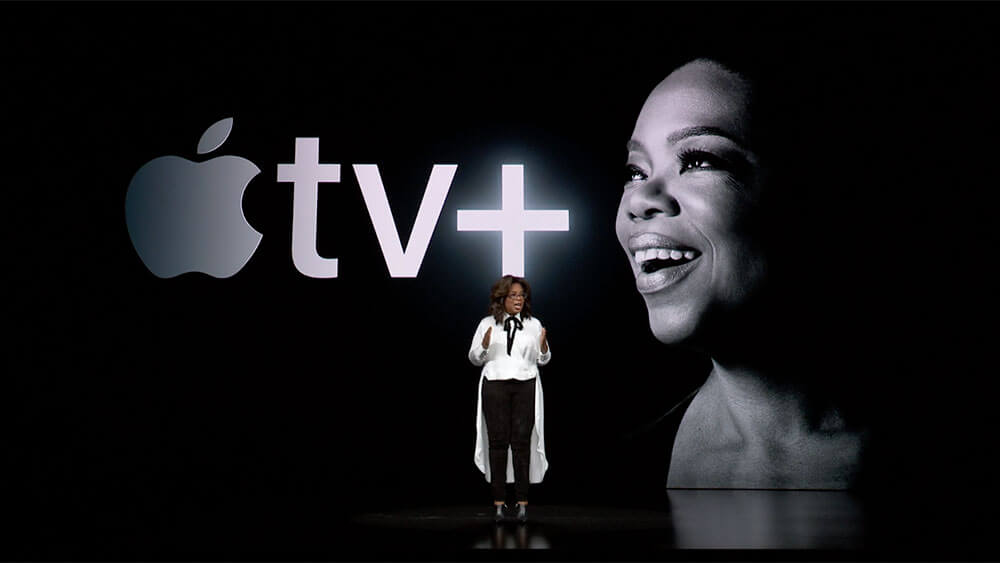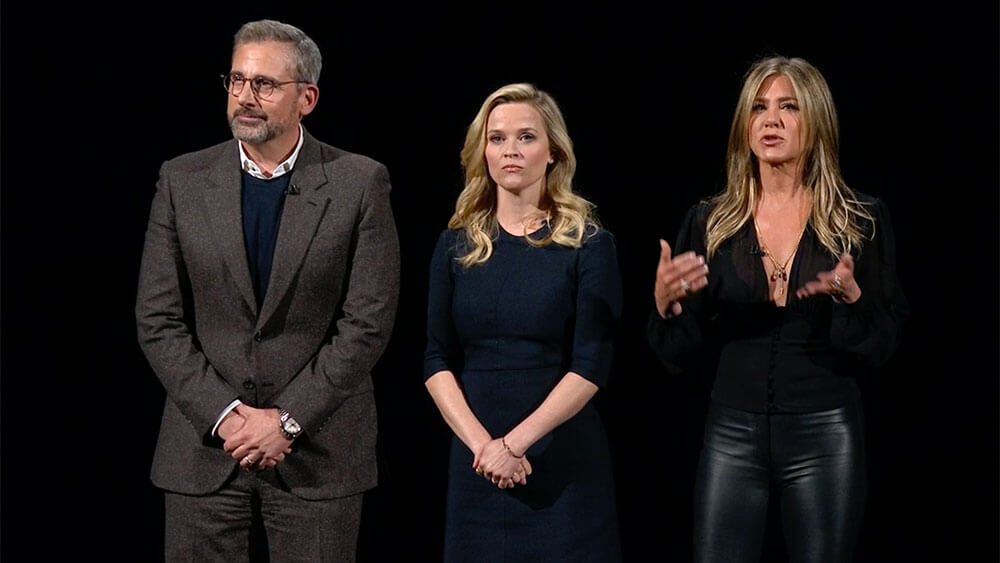
Oprah Winfrey will create two new documentaries that will stream on Apple TV+. (Screen grab)
Whether launching a new smartwatch, iPhone, or iPad, Apple’s events always turn heads. When Apple CEO Tim Cook took the stage in Silicon Valley on March 25, though, he didn’t make any new product announcements that will lead to hordes of tech enthusiasts camping out in front of Apple stores. Apple’s special event at the Steve Jobs Theater unveiled plenty of new updates for the company’s business, but the theme had a tried-and-true ring to it: Content is king.
Apple already occupies a place in the pockets, on the desks, and next to the bedsides of many of its loyal customers — and the company’s new offerings are about fueling those devices with what Cook called “services that deliver content to you whenever and wherever you are.” For Apple, “content” covers everything — education with a new Apple News+ subscription service, gaming with a new Apple Arcade subscription service, and entertainment with a new Apple TV+ subscription service.
Consumers will be hearing plenty of details about these services in the coming months as Apple prepares to launch each of them and attract paying subscribers. While you may not be able to subscribe to any of them just yet, you can take a lesson from Apple’s approach to making content available to your own audience.
Subscriptions Should be Shareable
As organizations create libraries of educational sessions and webinars, most of them use a conventional approach that gives each customer individual access to all that content. But Apple believes that one should include many. Roger Rosner, vice president of applications, said that an Apple News+ subscription will offer access to a customer’s entire family. The service includes more than 300 magazines, The Wall Street Journal, the Los Angeles Times, and a range of other sources to keep users updated on current events. “If you subscribed to each of the publications included in this, it would cost more than $8,000 per year,” Rosner said. “But you’ll pay $9.99 per month, and that subscription is available to your whole family.”
As organizations work to monetize their educational content, it may be wise to consider offering shared access to an individual’s work “family.” Rather than asking four employees in the same office to each pay for a content subscription, Apple’s approach is a reminder that sharing is caring — and it also creates the perception of additional value.
Privacy Is a Powerful Selling Point
With many of its Silicon Valley neighbors facing scrutiny over their handling of user data, Apple aimed to distance itself from those that profit from selling all that information. “What you read in Apple News will not follow you across the web,” Rosner said. “We don’t allow advertisers to track you.”
That commitment to confidentiality extends to the soon-to-launch Apple Card, a new credit card from the company. “Apple doesn’t know what you bought, where you bought it, and how much you paid for it,” Jennifer Bailey, vice president of Apple Pay, said.
Bailey said that Apple’s offerings use “on-device intelligence” to create a personalized experience. Instead of storing information on Apple’s servers, the information is stored on the customer’s device. Cook reinforced that message, noting that all of Apple’s services “are designed to keep your personal information private and secure.” That announcement met with generous applause, and it’s a reminder that event organizers who are dealing with big data have big responsibilities to be transparent about what they’re doing with it.
The Experience Should Feel Simple Across All Devices
Whether playing a game on Apple Arcade or watching a movie on Apple TV+, users who have to press the pause button will be able to find a familiar starting point when they return. Apple stressed that people should be able to “pick up right where they left off across all their devices.” It’s a reminder of the importance of a good omni-channel experience, and it should catch the attention of any organization that deals in the 60-minute webinar landscape. No one enjoys rewinding or fast forwarding. They expect organizations to be smart enough to have smart content strategies that leverage the power of their smart devices.
As you think about ways to infuse an Apple-like mindset in your organization’s content strategy, you also can get excited about what Apple has in store for your own content consumption. From two new Oprah Winfrey documentaries to a comedy called “The Morning Show” starring Reese Witherspoon, Jennifer Aniston, and Steve Carell, the company has embraced another principle that has withstood the test of time: Celebrities rule.
David McMillin is an associate editor at Convene.

Steve Carell, Reese Witherspoon, and Jennifer Aniston will star in a new comedy called “The Morning Show” on Apple TV+. (Screen grab)
